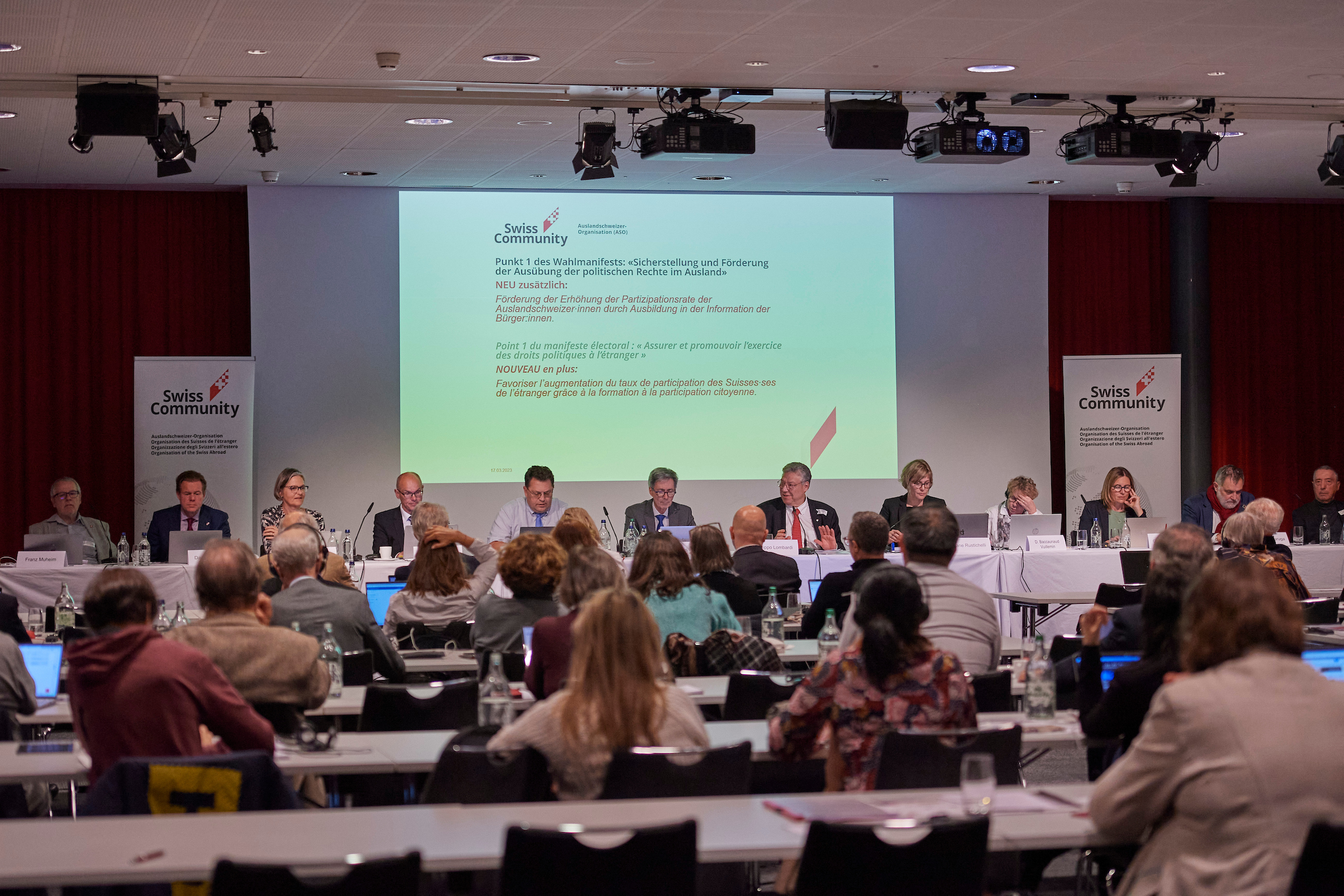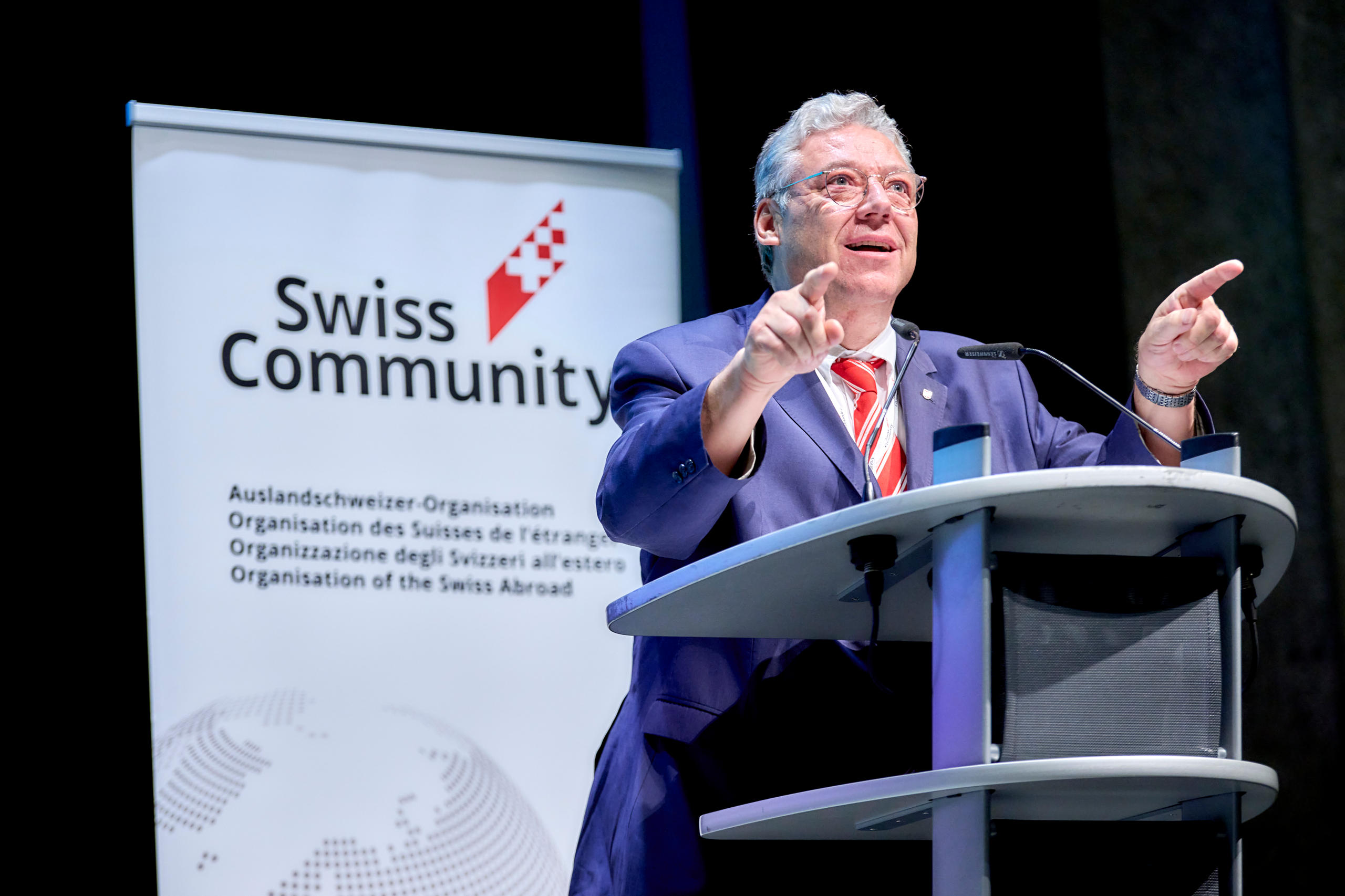Wake-up call for Swiss voters abroad

The Council of the Swiss Abroad recently met in Bern to adopt a manifesto in the runup to federal parliamentary elections this autumn. The organisation wants to tackle the issue of low voter turnout among the Swiss diaspora.
Swiss politicians are becoming increasingly aware of the importance of the Swiss Abroad – they are potential voters whose ballots can be won. This is especially the case this year as Switzerland gears up to elect a new parliament in October. In theory, the Swiss Abroad could decide up to six of the 200 seats in the House of Representatives.
But there’s just one problem. Voter turnout among the diaspora tends to be low. There are 800,000 Swiss living abroad, but only a quarter of them are registered on the electoral rolls of their home cantons. And only 25% of them regularly make use of their right to vote.
Why do more Swiss Abroad not want to exercise their democratic rights? And why is voter turnout so low, even among those Swiss Abroad who are registered to vote?
Workshop on voter turnout
These questions were raised by two members of the Council of the Swiss Abroad, Antoine Belaieff from Canada and Carmen Trochsler from Australia. In early March they organised a workshop for other council members.

The aim of the workshop was to find ways to encourage more Swiss Abroad to participate in the democratic process at home.
What ideas do the Swiss abroad have? We asked them (check out our video below):
The Swiss community intends to discuss the results of the workshop with representatives of cantonal administrations in May. An idea is also doing the rounds as to whether the Swiss constitution contains provisions that could be invoked for political education of the Swiss Abroad.
On their websiteExternal link, the Organisation of Swiss Abroad (OSA) now provides expat citizens with information on the upcoming nationwide vote.
Movement in important areas
The main agenda item at the recent meeting of the Council of Swiss Abroad on March 17 was the adoption of a so-called election manifesto. This reflects the demands of the Swiss diaspora addressed to politicians in Switzerland. “Parties, candidates and government agencies need to become aware of the importance of [our] needs,” said OSA President Filippo Lombardi.
The manifesto has been out since last November but has not yet been ratified by the entire Council.

More
Swiss Abroad make seven political demands
In the meantime, a few things have changed. Most of all concerning the top priority: ensuring political rights are available and used. From the point of view of the Swiss community abroad, e-voting is the best solution. The federal government has just resumed tests of e-voting using a new system.

More
E-voting trials to resume for upcoming votes
The government has given up on an alternative proposal from parliament, however. In the House of Representatives, Andri Silberschmidt had proposed that voting papers should be sent out in diplomatic bags. A study into this was adopted by the government in mid-March. According to a press releaseExternal link, this study found “that voting papers reach the Swiss Abroad on time in the vast majority of cases”.
Hope for progress
Meanwhile, the troubled relationship between Switzerland and the EU remains a cause for concern for the Council of the Swiss Abroad.
The stalled political game between Bern and Brussels has worried the delegates from the Swiss associations abroad – especially those in EU countries, of course. Social Democrat senator Carlo Sommaruga, who is on the board of OSA, poured cold water on any expectations of a quick breakthrough, referring to the complex political landscape in Switzerland.
The Swiss community also had to rein in its expectations as regards its earlier demand for easier access to voluntary old-age pension contributions. Existing international social security agreements give little room for manoeuvre. To expose the cash-strapped old age pension fund to extra demands from the Swiss Abroad would not go down well in the current political situation, warned Sommaruga.
Resources are shrinking at the foreign ministry too. The demand for a “consular network to meet the needs of Swiss Abroad” was on a collision course with current belt-tightening efforts, commented Laurent Perriard, who is interim head of Consular Affairs.
The OSA has set up a website called “Factor Swiss” with the support of the foreign ministry aimed at gathering and streamlining communication from Swiss communities abroad. “Today many members of Swiss associations abroad are older people who have little affinity with social media networks,” says Maria Luisa Bernini, project leader for “Factor Swiss” at OSA.
The organisation got the idea of using this website to provide easily adaptable forms to write messages for social media. Raising the profile of Swiss associations on social media is part of the goal of winning over the younger generation. It’s not just that, however. The OSA also hopes to strengthen communication links among the Swiss Abroad, “on the one hand to give them useful information and on the other hand to understand their needs better,” explains Bernini. A unified and bigger group would have more political clout.
Translated from German by Terence MacNamee

More
How political parties are courting the votes of the Swiss Abroad

In compliance with the JTI standards
More: SWI swissinfo.ch certified by the Journalism Trust Initiative









You can find an overview of ongoing debates with our journalists here . Please join us!
If you want to start a conversation about a topic raised in this article or want to report factual errors, email us at english@swissinfo.ch.